Speakers
Keynote Presentation
Alan Liu is Distinguished Professor in the English Department at the University of California, Santa Barbara, and an affiliated faculty member of UCSB’s Media Arts & Technology graduate program. Previously, he was on the faculty of Yale University’s English Department and British Studies Program. Dr. Liu founded the NEH-funded Teaching with Technology project at UC Santa Barbara called Transcriptions: Literature and the Culture of Information and his English Dept’s undergraduate specialization on Literature and the Culture of Information. During 2002-2007 he was a member of the Board of Directors of the Electronic Literature Organization (ELO) and chair of the Technology/Software Committee of the ELO’s PAD Initiative (Preservation / Archiving / Dissemination of Electronic Literature). He has published many books, including Wordsworth: The Sense of History (Stanford Univ. Press, 1989) and The Laws of Cool: Knowledge Work and the Culture of Information (Univ. of Chicago Press), and Local Transcendence: Essays on Postmodern Historicism and the Database (Univ. of Chicago Press, 2008).
Invited Participants
Matthew Battles is Associate Director of metaLAB at Harvard, where he develops design interventions, media provocations, and technology projects in collaboration with a team of architects, web designers, scholars and artists. Matthew has written about the cultural dimensions of science and technology for such venues as The American Scholar, The Atlantic, The Boston Globe, Harper’s Magazine, and The New York Times. His book Library: an Unquiet History (W. W. Norton) is available in eight languages worldwide and has been in print since 2003, and he is coauthor, with Jeffrey Schnapp, of The Library Beyond the Book (Harvard 2014). His newest book, a material and cultural history of writing entitled Palimpsest: A History of the Written Word, appeared in 2015 under the Norton imprint.
Patricia Fumerton is a Professor in the English Department at the University of California, Santa Barbara, where she has taught since 1987. She is founder and director here of the director of the English Broadside Ballad Archive(link is external) (EBBA). Her central interests include sixteenth- and seventeenth-century culture and literature, high and popular culture, visual culture, subjectivity, and postmodernism. She is the author of Unsettled: The Culture of Mobility and the Working Poor in Early Modern England (2006), Cultural Aesthetics: Renaissance Literature and the Practice of Social Ornament (1991), editor of Broadside Ballads from the Pepys Collection: A Selection of Texts, Approaches, and Recordings (2013), and co-editor of The Making of a Broadside Ballad (EMC Imprint Press), Ballads and and Broadsides in Britain, 1500-1800(2010) and Renaissance Culture and the Everyday (1999). She is currently working on a book titled Moving Media, Tactical Publics: Broadside Ballads in Early Modern England.
James Lee is Assistant Professor of Digital Humanities and Early Modern Literature and Culture at University of Cincinnati. Lee’s research and teaching focus on Renaissance literature and culture and the digital humanities, and he is co-director of the Digital Humanities / Digital Scholarship Center, hosted in the UC Libraries. Lee’s first book, under contract with Northwestern University Press, is entitled “The Two-Soul’d Animal”: The Poetics of Faculty Psychology in Early Modern England. He is also working on a book-length digital history of Renaissance globalism, race, and geography entitled “Mapping a Global Renaissance with 53,829 Texts,” which weaves together multiple digital methods including network analysis, topic modeling, and mapping to tell a new story of how Renaissance England began to imagine its place in a global frame of trade and diplomacy in 50,000+ texts of the era. Lee’s research has been supported by the University of Iowa’s Obermann Center for Advanced Studies, the Andrew W. Mellon Digital Bridges for Humanistic Inquiry grant, Grinnell College’s Innovation Fund, Grinnell College’s Data Analysis and Social Inquiry Lab, the Howard Hughes Medical Institute, and the Intel Corporation.
Élika Ortega is Assistant Professor of Cultures, Societies, and Global Studies at Northeastern University. Her work focuses on the intersection of literature, print-digital culture, and global exchanges in the 21st Century. She writes about digital literature, media, materiality, reading practices, global networks, digital humanities, and multilingualism. Her projects include “A Handbook of E-Lit Reading”, an archive of instructions to read electronic literature works; “No Legacy || Literatura electrónica” (2016) an exhibition of electronic and print literature in Spanish, Portuguese, and English; and Textual Environments, her monograph investigating print-digital works of literature. Élika serves on several professional organizations. She is chair of Global Outlook::Digital Humanities, executive council officer of the Association for Computers and the Humanities, and part of the communications team of the Electronic Literature Organization.
Miriam Posner is an Assistant Professor in Information Studies at UCLA. For many years, Posner coordinated UCLA’s digital humanities program and collaborated with students to create projects like Origin of the Species, early African-American cinema, and the Getty Provenance Index. As a digital humanist, Posner works on a wide range of projects, from mapping to network analysis, and she has a particular interest in thinking about and working with data from cultural institutions. A media scholar who’s interested in science and technology, Posner is finishing up a book, Depth Perception, and working on a new project related to supply-chain capitalism.
Roopika Risam is Assistant Professor of English, Faculty Fellow for Digital Library Initiatives, Coordinator of the Digital Studies Graduate Certificate Program, and Coordinator of the B.A./M.Ed. English Education program at Salem State University. Her research examines intersections between postcolonial, African American, and US ethnic studies, and the role of digital humanities in mediating between them. Her monograph New Digital Worlds: Postcolonial Digital Humanities in Theory, Praxis, and Pedagogy will be published by Northwestern University Press in 2018. She is also co-editor of Debates in the Digital Black Atlanticfor the Debates in the Digital Humanities series (University of Minnesota Press). Risam’s digital projects include The Harlem Shadows Project, a digital critical edition of Claude McKay’s poetry; Visualizing Du Bois, a mapping project of W.E.B. Du Bois’s correspondence; and Digital Salem, a portal for small-scale, student-led digital humanities projects that tell the untold stories of Salem, Massachusetts. Risam also serves on the Association for Computers and the Humanities Executive Council, GO::DH Executive Board, and the Digital Scholarship in the Humanities editorial board.
Digital Bridges Participants
Jenny Anger is Professor of art history at Grinnell College. Her research focuses on twentieth-century European art history and theory. With the support of Digital Bridges, Anger incorporated 3-D modeling into her art history courses, training her students to create a historical recreation of the Erster Deutscher Herbstsalon (First German Autumn Salon). The salon was held on the fourth floor of Potsdamer Straße 75, today Potsdamer Straße 180, Berlin, in the fall of 1913 (September 20-December 1), but original photographs have been difficult to locate. Anger’s students explored the relationship between art works and their contexts in building a 3-D model of the original building and space.
Timothy Arner is an Associate Professor at Grinnell College, specializing in medieval literature. His research and teaching interests include the writings of Geoffrey Chaucer, the influence of classical texts on Middle English poetry, and the intersections between fourteenth- and fifteenth-century literature and politics. He served as a pedagogical specialist and consultant, developing teaching materials that build upon a project created by Kathy Lavezzo (University of Iowa) and Lisa Lampert-Weissig (UCSD) and supported by Digital Bridges–Remappings: Christians and Jews in Early England. This digital project retells the story of Jewish-Christian interaction in medieval and renaissance England via maps, text, video and other media.
 Aiden Bettine is a PhD student in the Department of History, focused on producing community-engaged digital history projects that centralize marginalized histories in the U.S.; his doctoral work at the UI is grounded in interdisciplinary methodologies and public scholarship. His dissertation research examines the history of Native Americans, public memory, and the city of Chicago. He was a participant at the 2018 Digital Bridges Summer Institute.
Aiden Bettine is a PhD student in the Department of History, focused on producing community-engaged digital history projects that centralize marginalized histories in the U.S.; his doctoral work at the UI is grounded in interdisciplinary methodologies and public scholarship. His dissertation research examines the history of Native Americans, public memory, and the city of Chicago. He was a participant at the 2018 Digital Bridges Summer Institute.
 Fred Boehmke is a Professor of Political Science at the University of Iowa, and the director of the Iowa Social Science Research Center in the Public Policy Center. His research focuses on the effect of direct democracy on interest groups. Boehmke published The Indirect Effect of Direct Legislation: How Institutions Shape Interest Group Representation (Ohio State University Press) in 2005. He also researches policy diffusion across American states.
Fred Boehmke is a Professor of Political Science at the University of Iowa, and the director of the Iowa Social Science Research Center in the Public Policy Center. His research focuses on the effect of direct democracy on interest groups. Boehmke published The Indirect Effect of Direct Legislation: How Institutions Shape Interest Group Representation (Ohio State University Press) in 2005. He also researches policy diffusion across American states.
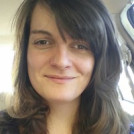
Christina Boyles is an Assistant Professor of Culturally Engaged Digital Humanities/Digital Rhetorics at Michigan State University.
 Matthew Butler is the Senior Developer for Media Production & Design for the Digital Scholarship and Publishing Studio (DSPS) at the University of Iowa.
Matthew Butler is the Senior Developer for Media Production & Design for the Digital Scholarship and Publishing Studio (DSPS) at the University of Iowa.
Diana Cates is a Professor of Religious Studies at the University of Iowa, whose research focuses on religious ethics and moral psychology. With the support of Digital Bridges, Cates collaborated with Professor James Elmborg (Library and Information Science, University of Alabama) to build a virtual world called Medville, which features a clinic and many places for reflection and discussion, including Contemplation Island. In the clinic, students view videos that simulate lifelike encounters with healthcare providers or patients. She will be joined by Darcy Metcalfe, a third-year Ph.D. student in the Department of Religious Studies at the University of Iowa. Darcy collaborated with Diana Cates, who is her advisor, in teaching beginning-of-life and end-of-life courses using a virtual clinic. She is preparing to write a dissertation on the ethical implications of the use of recently-developed gene-editing technologies on human embryos.

Mark Christel is Librarian of the College, Associate Professor, and Department Chair of the Library at Grinnell College. Prior to coming to Grinnell, Mark worked as Humanities Librarian at Hope College, as Associate Director for Reader Services and Collections at Vassar College, and for 8 years as Library Director at the College of Wooster in Ohio.
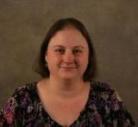
Heather Cooper is a Visiting Assistant Professor in History and Gender, Women’s, and Sexuality Studies (GWSS) at the University of Iowa. As a scholar of African American history, her research and teaching interests include slavery and emancipation, historical memory, and social justice movements. She will be joined by Dellyssa Edinboro, a graduate student in the Education Policy and Leadership Studies Department at the University of Iowa. Dellyssa is in the Schools, Culture, and Society program and she focuses on the History of American Education. She recently completed the Graduate Certificate in Gender, Women’s, and Sexuality Studies and received the Adele Kimm Scholarship from the GWSS Dept. Heather and Dellyssa are founding members of the first state satellite of the Colored Conventions Project (CCP), a Digital Humanities project that is working to recover the history of nineteenth-century black activism that took place in state and national conventions across the U.S. from the 1830s to the 1890s. The Iowa CCP aims to create an accessible (digital) archive of Midwestern black history; build courses and curriculum that bring that history into K-12 and college classrooms; and create new scholarship and digital exhibits that situate the often male-dominated convention movement in a deeper history of community building and activism that includes the central work of African American women.
Barbara Eckstein is a Professor of English at the University of Iowa whose research focuses on literature’s relation to space and place. Digital Bridges supported a collaboration between Eckstein and Kathleen Oberlin on the People’s Weather Map of Iowa. Together they worked with students to collect and analyze Twitter data related to extreme weather events in the state and region.
David Eichmann is an Associate Professor and Director of the School of Library and Information Science. His research interests lie in the general area of information systems, particularly representation and retrieval. He is currently active in the adaptive filtering of newswire stories, question answering and Web-based retrieval. He collaborated with Blaine Greteman to build the interactive network site Shakeosphere.
James Elmborg is a Professor of Library and Information Science and Director of the School of Library and Information Science at University of Alabama. Before leading SLIS at Alabama, Elmborg was a co-PI on the Digital Bridges for Humanistic Inquiry grant and Director of SLIS at University of Iowa from 2006-2011.
Caleb Elfenbein is an Associate Professor in both History and Religious Studies at Grinnell College. His research explores the emergence of Islamist thought, comparative intellectual history, the making of modern forms of religion, and Islam in America. Elfenbein is developing a multi-dimensional project on the experiences of Muslims in American public life that includes the website Mapping Islamophobia. More recently, Elfenbein has entered into a collaboration with Jason Harshman of the University of Iowa College of Education, working to expand the scope of Mapping Islamophobia to Iowa public schools.
Blaine Greteman is an Associate Professor of English at the University of Iowa, whose research focuses on early modern book history, poetry, and drama, including Milton and Shakespeare. Working with David Eichmann, Greteman built Shakeosphere, an online tool that is mining and mapping nearly every written record in English before 1800, including major print and manuscript catalogues like the English Short Title Catalogue, OCLC-WorldCat, and EEBO-TCP.
Jason Harshman is an Assistant Professor of Education at the University of Iowa. His research focuses on Global Citizenship Education and Social Studies Education. Together with Caleb Elfenbein, he developed aspects of the Mapping Islamophobia project specifically for application in Iowa’s public schools.

Elizabeth Heineman is Professor and Chair of the History department at the University of Iowa. Her research interests include Modern Germany and Europe, Gender and Sexuality, Historical memory, and Human Rights and Atrocity. She was a participant at the 2017 Digital Bridges Summer Institute.
Matthew Kluber is an Associate Professor of Art at Grinnell College focusing on print media, digital media, drawing and hybrid media. He has shown his prints, drawings, paintings and digital work at galleries and museums including: 123 Watts Gallery in New York City, Klein Art Works in Chicago, Rudolph Poissant Gallery in Houston, the Portland Museum of Art in Oregon, the Austin Museum of Art in Texas, the Bemis Center for Contemporary Art and Joslyn Art Museum in Omaha, and at the Des Moines Art Center, among others. He collaborated with Laurel Farrin on a summer exploration of 3-D printing as art practice.
Kim Marra is a Professor of Theatre Arts and Director of graduate studies. She also holds a quarter-time appointment in the American Studies Department and is affiliate faculty in Gender, Women’s and Sexuality Studies. She has received support from Digital Bridges for her digital project The Pull of Horses: Embodied Interactions across Urban American Species, 1865-1920, a digital video project depicting urban life of this transformational era, and exploring how cross-species interactions moved histories and constructed economic and cultural identities.
Carolyn Lewis is an Assistant Professor of History at Grinnell College who works in the fields of American women’s history and the histories of sex, sexuality, and medicine in the United States. With the support of Digital Bridges, Lewis worked with undergraduate student Helen Eckhard to build the Digital Sexuality Archive. This archive hopes to build a repository of digitized primary sources related to the history of sex and sexuality.
Celeste Miller is an Assistant Professor of Dance and an artist at Grinnell College. Commissions for her work have come from the High Museum of Art, Atlanta; Augusta Museum of Art, Emory University, American Festival Project, Smithsonian’s Discovery Theatre, and many more. In collaboration with Grinnell undergraduate Charlotte Richardson-Deppe, Miller developed Digital Bridges to Dance, a project devoted to building synchronous and asynchronous online digital practices.
 Tammy Nyden is an Associate Professor of Philosophy at Grinnell College. A mother and an advocate for children’s mental health, Nyden currently serves on the Iowa Mental Health Planning and Advisory Council and Iowa Children’s Mental Health and Well-Being Advisory Committee. Recently, her work has taken shape online in Mothers on the Frontline, which provides a platform for mothers to share stories about raising children with mental health disabilities, and Mental Health Policy and Outreach, which is devoted to gathering, curating, and sharing resources for people interested in mental health policy in Iowa.
Tammy Nyden is an Associate Professor of Philosophy at Grinnell College. A mother and an advocate for children’s mental health, Nyden currently serves on the Iowa Mental Health Planning and Advisory Council and Iowa Children’s Mental Health and Well-Being Advisory Committee. Recently, her work has taken shape online in Mothers on the Frontline, which provides a platform for mothers to share stories about raising children with mental health disabilities, and Mental Health Policy and Outreach, which is devoted to gathering, curating, and sharing resources for people interested in mental health policy in Iowa.
Kathleen (Casey) Oberlin is an Assistant Professor in the department of Sociology at Grinnell College. Her research and teaching interests include the sociology of science and technology, social movements, place and built environment, religion and science, medical sociology, and research methods (qualitative, quantitative, and spatial). Recently, she has collaborated with Barbara Eckstein on incorporating social media data into People’s Weather Map of Iowa.
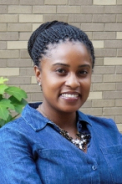
Jessica Welburn Paige is an Assistant Professor in the departments of Sociology and African American Studies at the University of Iowa. Professor Welburn’s research interests include race and ethnicity, social mobility, urban inequality, cultural sociology and qualitative research methods. Her work has focused on the experiences of African Americans in the post-Civil Rights era, including how they conceptualize their social mobility prospects and their strategies for navigating persistent racism and discrimination. She was a participant at the 2017 Digital Bridges Summer Institute.
Mirzam Pérez is an Associate Professor of Spanish and Portuguese at Grinnell College, focusing on theatre/performance, transatlantic studies, and Early Modern Spanish literature. With her students, she built the pedagogical project Designing Empire / Diseñando Imperios. Designing Empire allows users the possibility of visualizing and mapping the early modern world, and it invites scholars to understand the complexities of this moment in time.
Nick Phillips is an Assistant Professor of Spanish at Grinnell College. His research and scholarly interests include contemporary Spanish and Latin American detective fiction, Spanish cinema, television and popular music, and Catalan language, literature, and film. With the support of Digital Bridges and undergraduate Margaret Giles, Phillips amassed a large collection of maps for their project Investigating Digital Cartographies of Spanish Detective Fiction.

Samuel A. Rebelsky is a Professor of Computer Science at Grinnell College. “SamR”, as his students call him, has been at Grinnell since 1997 (He therefore considers himself part of the Grinnell class of 2001). His interests include functional programming, algorithmic art, and computer science education.
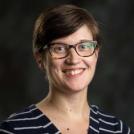
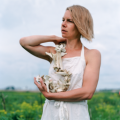 Lee Emma Running received her MFA from the University of Iowa in 2005 and joined the faculty of Grinnell College in the same year. She teaches Sculpture and Drawing, and has a specialization in hand papermaking. Running’s sculptural installations exist between drawing and sculpture. Her work is an investigation of form and pattern found in the natural world. Recent projects look at systems and structures that are similar in micro and macroscopic scale, such as the way the veins in a leaf mimic those in our bodies as well as a river system seen from space.
Lee Emma Running received her MFA from the University of Iowa in 2005 and joined the faculty of Grinnell College in the same year. She teaches Sculpture and Drawing, and has a specialization in hand papermaking. Running’s sculptural installations exist between drawing and sculpture. Her work is an investigation of form and pattern found in the natural world. Recent projects look at systems and structures that are similar in micro and macroscopic scale, such as the way the veins in a leaf mimic those in our bodies as well as a river system seen from space.
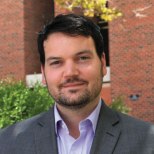
Robert Shepard is a GIS Developer at the University of Iowa Digital Scholarship and Publishing Studio (DSPS) at University of Iowa Libraries. He is also an associate fellow at the Center for Great Plains Studies at University of Nebraska. Previously, he worked at the Center for Digital Research in the Humanities, where he managed GIS server infrastructure, developed geospatial data, and designed interactive web mapping applications for digital history projects.
Joyce Tsai is a curator at the University of Iowa Museum of Art and a Clinical Associate Professor in the College of Education. Her research and teaching engage questions of art, abstraction, politics, and technology in the 20th century as well as the history and philosophy of art education. With funding from Digital Bridges, Tsai has launched Museum without Walls, which offers students the opportunity to engage in original research on the early history of the Intermedia MFA program, established in 1968 by Hans Breder at the University of Iowa.
Deborah  Whaley is an artist, curator, and writer. She is currently Senior Scholar for Digital Arts and Humanities Research for the Digital Scholarship and Publishing Studio (DSPS) and Professor of American and African American Studies at the University of Iowa. Her research and teaching fields include the institutional history, theories, and methods of American and Transnational American Studies, 19th Century to the Present Cultural History, Comparative Ethnic Studies, Black Cultural Studies, Popular Culture, the Visual Arts, Digital Humanities and Critical Theory. As senior scholar and as an ambassador for DSPS, she collaborates with faculty, students, and staff who produce or engage with digital scholarship, research, and new media technologies and pedagogy.
Whaley is an artist, curator, and writer. She is currently Senior Scholar for Digital Arts and Humanities Research for the Digital Scholarship and Publishing Studio (DSPS) and Professor of American and African American Studies at the University of Iowa. Her research and teaching fields include the institutional history, theories, and methods of American and Transnational American Studies, 19th Century to the Present Cultural History, Comparative Ethnic Studies, Black Cultural Studies, Popular Culture, the Visual Arts, Digital Humanities and Critical Theory. As senior scholar and as an ambassador for DSPS, she collaborates with faculty, students, and staff who produce or engage with digital scholarship, research, and new media technologies and pedagogy.
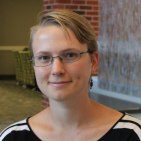
Nikki White is a Digital Humanities Research & Instruction Librarian at the University of Iowa’s Digital Scholarship and Publishing Studio (DSPS). Prior to this role, she worked as a researcher for the University of Iowa Digital Studio for Public Humanities.
